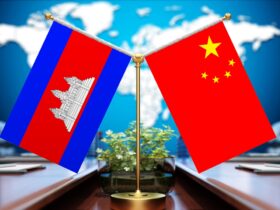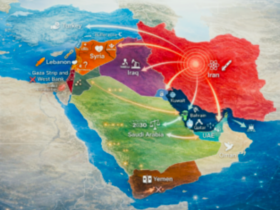Europe
The aggravation of Turkish-Greek relations
In August, Greece did everything possible to designate Turkey as an enemy in public discourse. On August 22, the Greek media reported that Greece had contacted the UN in connection with Turkey’s actions in the Mediterranean Sea, considering them a threat to the security of the entire region.
On August 6, Greek Foreign Minister Nikos Dendias signed an agreement with Egyptian Foreign Minister Sameh Shoukry on the demarcation of maritime zones in the Mediterranean. This was a response to the agreement, which was signed last year by the Government of National Accord of Libya and Turkey to the sea shelf and EEZ. The Turkish Foreign Ministry stated that Ankara did not recognize this document and sent its research vessel Oruc Reis accompanied by a group of warships for seismic exploration on the Aegean Sea shelf near the island of Kastellorizo.
In response, Greece put its armed forces on alert and planned to conduct an air-sea exercise in the Mediterranean Sea from August 25 to 27.
The aggravation of Turkish-Greek relations is due to the fact that Athens is opposing Ankara’s attempts to consolidate its leading position in the Eastern Mediterranean by trying to lock Turkey off its coast.
Most EU countries have a distinctly pro-Greek position.
On August 29, the Vice President of Turkey Fuat Oktay stated that Greece’s desire to expand its territorial waters in the Mediterranean Sea may cause a military conflict.
Protests in Germany
On August 29, mass protests against restrictions imposed by the German authorities in connection with the spread of coronavirus took place in central Berlin. In total, by various estimates, the action was attended by 20,000 to 38,000 people.
Based on the symbols of the protesters, the demonstration was attended by both left and right forces united in opposition to the current government.
The protesters chanted “Resistance!”, “We are the people!” and also attempted to storm the Reichstag. Flags of the German Empire, Russia and the United States were used due to the fact that some populists positively perceived the leaders of these countries: Donald Trump and Vladimir Putin).
Djukanovich’s defeat
On August 31, parliamentary elections were held in Montenegro. According to initial data, the victory was won by representatives of the opposition party. Thus, the people of Montenegro finally voted out Milo Djukanovic, who had ruled the country since 1991.
Djukanovic, who is accused of having ties to the Italian and Albanian mafia in recent decades was a loyal Western satellite and even brought Montenegro into NATO despite mass protests and the positions of the influential Orthodox Church of the country.
Djukanovic, however, refuses to admit his defeat, despite the coalition “For Montenegro’s Future” and several other opposition parties and movements receiving a total of 50.3% of the vote, the ruling Democratic Party of Socialists – 33%.
Now everything depends on whether the opposition can create a stable coalition to oust Djukanovic from power.
Eurasia
Protests in Belarus
On August 8, presidential elections were held in Belarus. According to the official results, the current head of state Alexander Lukashenko won by a wide margin (80% of votes). The Belarusian opposition organized mass protests in response. The police suppressed the protests, which in turn led to a new wave of mass demonstrations.
Protests were supported from abroad and organized in accordance with the methods of color revolutions. The goal is to oust Lukashenko’s government and install a pro-Western one, which will allow the US and EU to conduct a dialogue from a position of force against Russia. Belarus also plays a key role in China’s Belt and Road Initiative (BRI) project, which increases the US’ interest in regime change.
Clashes at the border between Azerbaijan and Armenia
During August, clashes continued on the border between Azerbaijan and Armenia, which began in July. More than two dozen people died on both sides.
According to Azerbaijani media, a soldier from Armenia was taken prisoner by soldiers of the Azerbaijani Armed Forces. He was caught trying to cross the border illegally.
Turkey has expressed its support to Azerbaijan. Joint Azerbaijani-Turkish exercises were held in Azerbaijan from July 29 to August 10. Escalation of tension in the region is beneficial for the US and EU as it confronts Turkish and Russian interests in the region and distracts both countries from the eastern Mediterranean and Syria.
Middle East
New gas for Turkey
On August 21, the President of Turkey Recep Tayyip Erdoğan stated that Turkey discovered 320 billion cubic meters of natural gas deposits in the Black Sea. The country’s goal is to start using its own natural gas by 2023.
The Turkish authorities hope that their own gas field will help reduce dependence on gas supplies from Iran, Azerbaijan and Russia. It will help Turkey to develop its industry effectively, reducing costs. However, gas field development requires serious investment.
The new field will not allow them to abandon gas imports in general – it can only cover Turkey’s gas needs for six years.
Second contract for S-400
Aleksandr Mikheev, president of the Russian arms company Rosoboronexport, announced that Turkey had signed a second agreement to purchase S-400 missile defense systems.
The second agreement between Turkey and Russia for the purchase of S-400 missile defense systems is important because it is with the second contract that Ankara gets the opportunity of joint production and technology transfer, which will allow Ankara to develop sovereign defense systems together with Moscow.
The agreement demonstrates that despite all the difficulties, there is an atmosphere of mutual trust between Turkey and Russia in the field of military and technical cooperation. The second S-400 contract also increases the risk of anti-Turkish sanctions from the United States.
Iraq: pro-American steps
The US and Iraq signed 7 major energy contracts totaling $8 billion. This was announced by the press service of the US Department of Energy on August 19, 2020.
The US Department of Energy drew the attention of the Iraqi side to the need to ensure energy independence from Iran as soon as possible. An agreement was reached on recreating the American-Iraqi Joint Coordinating Committee on Energy (Energy JCC). American companies also received new contracts for oil and gas development in Iraq.
It is noteworthy that during the meeting with Iraqi Prime Minister Mustafa al-Kadhimi, US President Donald Trump promised to withdraw troops from Iraq, but did not say when.
Thus, the Iraqi government delegation’s visit to the United States resulted in deepening the country’s dependence on the United States. Iraq’s actions demonstrated its weakness and inability or unwillingness to seek a speedy withdrawal of US troops, for which the Iraqi parliament had previously voted.
Iran: an arms embargo
The UN Security Council rejected the US’ resolution to extend the arms embargo on Iran because a majority of Security Council members abstained in the vote. This was announced Saturday night, August 15, by US Secretary of State Michael Pompeo. Russia and China opposed the US’ proposal to extend the embargo.
The arms embargo against Iran expires on October 18, 2020. The US, however, says that it will punish unilaterally all those who sell weapons to Iran.
The UAE and Israel: establishing diplomatic relations
On August 13, US president Donald Trump stated that Israel and the United Arab Emirates agreed on a complete normalization of relations with the US acting as an intermediary.
In the coming weeks, delegations from Israel and the UAE are to sign bilateral agreements on investment, tourism, air travel, security, telecommunications, energy, health, culture, environment and the opening of embassies in both countries.
Given the apartheid policy pursued by Israel against Palestine, the agreement between the UAE and Israel was seen in the Arab and Muslim world as treason.
Palestinian President Mahmoud Abbas called the agreement between Israel and the UAE a betrayal of the Palestinian people. Turkey announced the possibility of suspending its diplomatic relations with the UAE.
The United Arab Emirates is one of the main pro-American Atlantic policy guides in the region. It is logical that Israel turned out to be their ally. It is to be expected that both Saudi Arabia and Bahrain will in some time make their close relations with Israel also evident.
Asia
The US-Chinese confrontation
In August 2020, tensions between the U.S. and China did not diminish. The main reason for the continued hostility was the situation in Hong Kong.
On August 10, the Chinese Foreign Ministry imposed sanctions against 11 US officials, a list which included a group of influential senators. Beijing’s decision was a response to the US Treasury’s imposition of sanctions against 11 officials from China and Hong Kong.
On August 10, famous media magnate Jimmy Lai, who supports the local opposition, was arrested: he is accused of undermining national security and collusion with foreign forces.
The debate over Hong Kong reflects a broader confrontation between the US and China for the future of the world. Washington is fighting to preserve a unipolar world, and China is fighting for the transition to multipolarity.
Shinzo Abe steps down
On August 28, Japanese Prime Minister Shinzo Abe announced that he had decided to resign due to longstanding illness. Abe announced that he would serve until his successor was determined. The new prime minister will be elected in parliament where the ruling party has the majority.
Abe expressed regret that he had failed to achieve results in solving the problem of the Japanese abducted by North Korean special services, the issue of amending the Constitution of the country and concluding a peace treaty with Russia.
On August 24, his term of office exceeded 2799 days, which was the longest among all previous heads of Japanese governments. It is not yet known who will take his place.
North America
Joe Biden
The Democratic National Convention in Milwaukee (Wisconsin) ended on August 20, where Democrats officially nominated former vice-president Joe Biden for the presidency and Senator Kamala Harris for vice president.
According to an analysis conducted by UWI (https://unitedworldint.com/13422-bidens-foreign-policy-team-war-hawks-lobbyists-and-the-deep-state/), if Biden and Harris come to power, their administration will pursue a policy of Obama-style liberal interventionism. There are many lobbyists from the US military-industrial complex surrounded by Biden, which suggests that US policy will not become less aggressive if President Donald Trump leaves the White House.
Latin America
Protests in Bolivia
Since July, there have been mass protests in Bolivia. They are mainly attended by the country’s indigenous population, who support President Evo Morales, who was overthrown last year in a military coup.
Tensions increased after the October 18 presidential election was postponed due to the coronavirus pandemic. Supporters of the deposed former leftist leader, Evo Morales, demand that voting be held on September 6.
The interim president of Bolivia, Jeanine Agnès, who has the support of the army and the ultra-right and is focused on the US has long postponed elections, also breaking his promise not to run for president.
The repression of protests in Bolivia has been accompanied by violence from the army and police, who were almost immediately given carte blanche by the new authorities for violence. The paramilitaries of Resistencia Juvenil Cochala, supported by the pro-American authorities of Bolivia, are involved in the suppression of the protest.
The events in Bolivia, which have barely been covered in world media, show the duplicity of the globalist media, since they look bad for the new pro-American government.
Africa
Military coup in Mali
On August 18, a military coup took place in Mali. Insurgents announced the arrest of President Ibrahim Boubacar Keïta and Prime Minister Boubou Cissé. The president announced his resignation a few hours after his arrest and the dissolution of the parliament and government. The mutineers announced the establishment of a National Committee to save the people and called for political transformation in the country leading to general elections.
The opposition in Mali promised to work with the leaders of the military coup on the political transition process in the country. The coup took place against the backdrop of months of demonstrations demanding the withdrawal of French troops from the country. The military coup d’état in Mali was a chance for the country to emerge from French neo-colonial control.
Libya: truce
On August 21, the head of the Government of National Accord of Libya (GNA) Fayez al-Sarraj and the opposing parliament in Tobruk (House of Representatives) Aghilla Saleh announced a truce.
The main condition was the creation of a demilitarized zone in the area of Sirte and al-Jufra.
The GNA had previously rejected all truce initiatives. A number of domestic and foreign policy factors may have led to that decision. For example, in Western Libya, which is controlled by the GNA, protests against armed militias, which hold real power on the ground, have increased. Two days after the news of the truce, a mass rally took place in Tripoli.
In addition, the announcement of an armistice, to be followed by a new political process and new elections in Libya, was preceded by diplomatic consultations between Turkey and the GNA, Turkey, Russia, the US, and the parties to the conflict. Foreign powers hope to take the role of mediator in the Libyan crisis.
The truce was followed by changes in the composition of the GNA. After mass protests, which were suppressed by military force, Fayez al-Sarraj dismissed Fathi Bashagha as Minister of Interior. The strongman from Misirata did not agree and called for an open investigation into the protest incidents. The political crisis in the GNA shows there are serious internal contradictions.
Oceania
Australia: COVID-19 second wave
On August 10, Australian Prime Minister Scott Morrison said the country is unlikely to open its internal borders before Christmas because of a record one-day increase in coronavirus deaths.
Previously, many state governments in Australia had taken severe restrictive measures to curb the coronavirus crisis, which led to the closure of several internal borders.
The city of Melbourne, home to nearly 5 million people, has been in isolation since early July. Despite this, 19 people died in Victoria State to which Melbourne belongs 24 hours before the Australian Prime Minister’s statement on SARS-CoV-2.
The largest increase in sick people in Australia was recorded on July 31 – 721 people. The example of Australia shows how the pandemic will develop in autumn and winter in Europe, Eurasia and the US. So far, the unfavorable situation in Australia shows that the second wave of coronavirus cannot be avoided.

















Leave a Reply